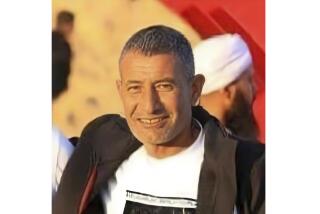Hostage nightmare goes on
Pardon Patricia Nieto if she wasn’t swept up in the euphoria that lifted this nation after the recent rescue of 15 hostages held by leftist guerrillas.
The rebel group the Revolutionary Armed Forces of Colombia, or FARC, which was tricked into giving up long-held hostages, including presidential candidate Ingrid Betancourt and three U.S. defense contractors, is still holding 700 people, including Nieto’s husband, Sigifredo Lopez.
Like other victims’ family members, Nieto, an attorney, fears that the predicament of her husband and other hostages will now go from international cause celebre to a back-burner issue.
“I rejoice in the happiness of families whose loved ones were released, but we feel abandoned,” said Nieto, whose husband, a state legislator, was kidnapped six years ago.
The spectacular commando operation that plucked the captives from insurgent hands July 2 lifted spirits in Colombia, generated admiration for President Alvaro Uribe and delivered another blow to the image of the FARC.
But the rescue’s aftermath should also serve as a continuing reminder of the many hostages still being held by rebel groups and criminal bands, hostage families emphasize. Although kidnappings have declined sharply in recent years, Colombia is second only to Iraq in that crime category.
Besides the FARC hostages, a leftist guerrilla group called the National Liberation Army is holding 270 people. Various criminal gangs in Colombia are thought to be holding an additional 1,800 against their will, according to the advocacy group Pais Libre of Bogota.
Hostage release negotiations between the Uribe government and the FARC have never gotten off the ground since he took office in 2002. The only releases during his presidency took place this year through the intervention of Venezuelan President and rebel sympathizer Hugo Chavez, who persuaded the FARC to give up six prisoners, including Betancourt’s campaign manager, Clara Rojas.
Past Colombian governments swapped jailed rebels for hostages. But Uribe has rejected rebels’ precondition of a demilitarized zone in which they could operate without impediment, much like the zone ceded them by Uribe’s predecessor from 1998 to 2002. For their part, the rebels have refused Uribe’s prerequisite: that they release hostages first, then negotiate.
“We feel completely impotent, caught between two sides that have hard and fast positions,” said Nieto, who with Lopez has sons ages 18 and 20.
In the past, Uribe consented to allow representatives from Spain, France and Switzerland to try to effect a release. But on a state visit to Venezuela last Friday, Uribe said he would no longer give such permission because, in unspecified cases, mediators ended up becoming rebel sympathizers.
While Betancourt, a dual French-Colombian citizen, and the Americans were held, the governments of France and the U.S. were pressing for their citizens’ release. French President Nicolas Sarkozy made the release of Betancourt, captured in 2002, a top priority. The U.S. government, according to embassy officials here, had a team of 100 working full time on freeing the three Americans seized in February 2003.
Another fear of Nieto and other victims’ family members is that the Uribe government will be less restrained in mounting military rescue missions that were ruled out for the “trophy” hostages. Hostage families and advocacy groups such as Pais Libre generally oppose the operations as too risky.
Sigifredo Lopez is the only survivor of 12 Valle del Cauca state deputies who were kidnapped in a FARC raid on the Cali statehouse in April 2002.
The FARC says the other 11 were killed in June of last year in a crossfire with another armed group, while the Uribe government believes they were slain by rebels who suspected a rescue operation was underway.
Lopez escaped death only because he was sick or being punished, Nieto said.
Milena Murillo, whose brother, police Maj. Enrique Murillo, has been a hostage since November 1998, also fears the government will resort to force to free hostages.
“We don’t know what measures the government will take, or whether the guerrillas might take revenge on the captives who remain,” Murillo said. Her brother, taken hostage when guerrillas overran his outpost in the southeast jungle state of Vaupes, is one of 24 Colombian police and soldiers believed to be in FARC hands.
Along with the uniformed prisoners, Lopez and two other kidnapped politicians still in rebel custody make up the 27 “exchangeable” hostages that the FARC wants to trade for an estimated 500 FARC rebels in government custody.
Massive marches on behalf of the hostages are scheduled July 20 in Colombia and in Paris. Betancourt will lead the demonstration in France, where she is currently visiting, saying a return to Colombia would be too dangerous.
But Nieto and other Colombian hostage families fear reunions are further away than ever. Her sons are growing up without a father, much like her husband, whose father was killed in a robbery when he was an infant.
“They were just starting to do ‘boy’ things with their father,” Nieto said. “Play soccer, ride horseback. . . . My husband wanted so much to have the relationship with his sons that he lacked in his own life.”
--
patrick.mcdonnell @latimes.com
More to Read
Sign up for Essential California
The most important California stories and recommendations in your inbox every morning.
You may occasionally receive promotional content from the Los Angeles Times.










